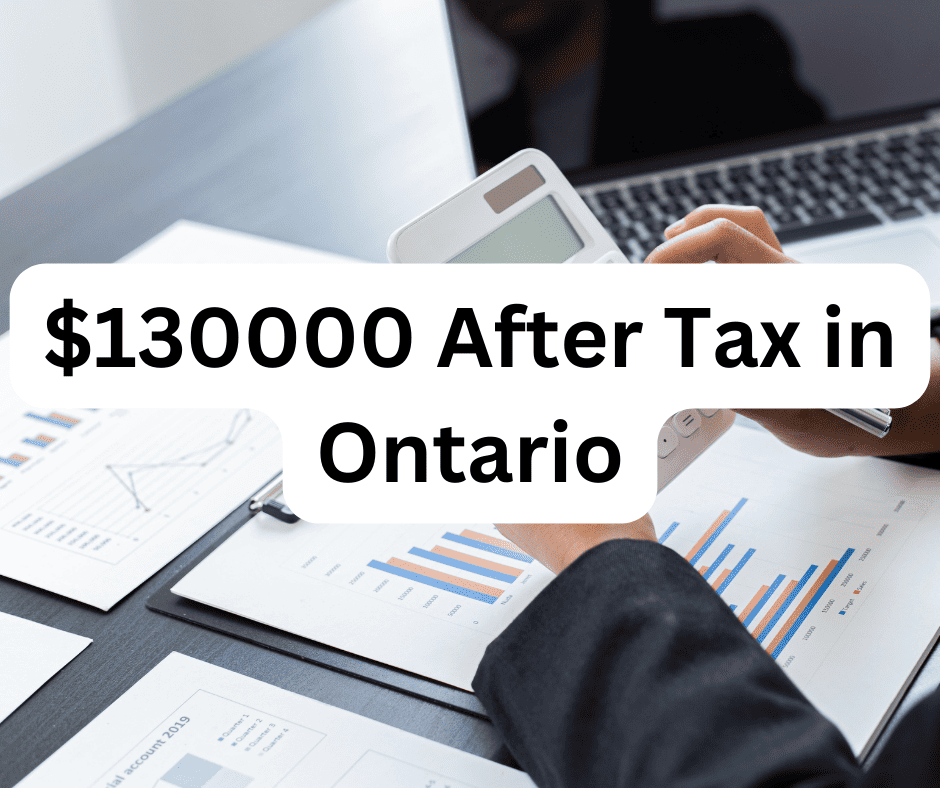Tax Rates on $130,000 in Ontario
The tax rates on $130,000 of income in Ontario consist of federal and provincial income taxes, as well as Canada Pension Plan (CPP) and Employment Insurance (EI) premiums.
Federal Tax Rates
The federal tax rates for 2023 applied to a taxable income of $130,000 are:
- 15% on the first $53,359 of taxable income, which is $8,004 in taxes
- 20.5% on the next $53,358, which is $10,938 in taxes
- 26% on the remaining $23,283, which is $6,053 in taxes
This results in federal income taxes owing of $24,995 on a taxable income of $130,000.
Ontario Provincial Tax Rates
The Ontario provincial tax rates for 2023 applied to a taxable income of $130,000 are:
- 5.05% on the first $46,226, which is $2,335 in taxes
- 9.15% on the next $46,228, which is $4,233 in taxes
- 11.16% on the next $57,546, which is $6,432 in taxes
- 12.16% on the remaining $36,000, which is $4,378 in taxes
This results in Ontario provincial income taxes owing of $17,378 on a taxable income of $130,000.
Combined Federal and Provincial Marginal Tax Rate
When you combine the top federal marginal tax rate of 26% and the top Ontario provincial marginal tax rate of 13.16%, the top combined marginal tax rate on income over $220,000 is 39.16%.
This means that for every additional $1 earned above $220,000, $0.3916 goes to income taxes.
On the $130,000 amount, the combined federal and Ontario average tax rate is 27.36%.
CPP and EI Premiums
In addition to federal and provincial income taxes, CPP and EI premiums are deducted from the $130,000 amount:
- CPP contributions: $3,500
- EI premiums: $953
So in total $3,500 + $953 = $4,453 is deducted for these mandatory contributions.
Take-Home Pay on $130,000
Given the above tax rates and deductions, the total income taxes and contributions owing on $130,000 of income are:
- Federal income tax: $24,995
- Ontario provincial income tax: $17,378
- CPP contributions: $3,500
- EI premiums: $953
The total deductions are $24,995 + $17,378 + $3,500 + $953 = $46,826
Therefore, the take-home pay or after-tax income on $130,000 is:
$130,000 - $46,826 = $83,174
This works out to a monthly take-home pay of $83,174 / 12 = $6,931.
Deductions on $130,000
The main deductions taken from the $130,000 yearly salary are:
- Federal income taxes of $24,995
- Ontario provincial income taxes of $17,378
- CPP contributions of $3,500
- EI premiums of $953
These mandatory deductions total $46,826 annually.
Additional deductions can be taken if the individual makes certain choices like contributing to an RRSP or union dues. However, the amounts above represent the basic deductions from a $130,000 salary.
Comparison to Other Provinces
Compared to other provinces, Ontario has a middle-of-the-pack tax rate on a $130,000 income. Provinces like Alberta, British Columbia and Saskatchewan have lower overall tax rates compared to Ontario.
For example, the after-tax income on $130,000 in the province of Alberta is approximately $91,000 which is higher than Ontario's after-tax amount of $83,174.
On the other hand, provinces like Nova Scotia and Prince Edward Island have higher overall tax rates on $130,000 at around $81,000 after-tax, lower than Ontario.
So Ontario finds itself in the middle - not the highest taxes but also not the lowest. It ranks somewhere between 5th and 8th in terms of lowest taxes across the 10 provinces, depending on family type and exact deductions.
Is $130,000 a Good Salary in Ontario?
Yes, $130,000 represents a well above average salary compared to typical incomes in Ontario.
The median household income in Ontario is approximately $76,000. So a single income of $130,000 is very strong relative to the provincial median.
Even after the various taxes and deductions, the take-home pay of over $83,000 would provide a comfortable lifestyle in most areas of Ontario.
While $130,000 does not make someone rich in the province, it places them well within the top 10-20% of individual income earners in Ontario. It is a objectively a good salary that affords financial flexibility compared to median salaries.
Some high cost-of-living cities like Toronto or Ottawa would erode some of that flexibility on a $130,000 income. But overall, it remains an above-average salary for the province.
Conclusion
In summary, $130,000 per year pre-tax in the province of Ontario is subject to the following taxes and rates:
- Federal income tax: $24,995
- Ontario provincial income tax: $17,378
- CPP contributions: $3,500
- EI premiums: $953
This results in after-tax take-home pay of approximately $83,174, or $6,931 per month.
While not an exorbitant high income amount, $130,000 represents a well above-average salary compared to median incomes in the province. It affords financial flexibility and a comfortable lifestyle for individuals and families in Ontario.

